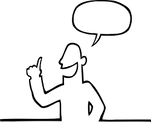weekly column
|
Each week, find a commentary on something connected to verses of Torah or another source of wisdom
|
|
Each week, find a commentary on something connected to verses of Torah or another source of wisdom
|
 The Leviticus:8 Project And if the priest sees that the rash has spread on the skin, the priest shall pronounce him unclean; it is leprosy. Leviticus 13:8 I’m not looking for sympathy. My shoulder started bothering me more than a year ago, the latest part of my body to betray me. Shortly thereafter, all five of the fingers on my right hand began to tingle, sometimes at the same time, sometimes in a sort of symphonic variation. Like the man I am, I tried to ignore it and treat it with stretching and ibuprofen. Eventually, I gave up and went to see some of the members of my growing medical team. I endured a roster of tests designed to figure out what was causing the pain. It’s amazing how many diagnostic protocols involve sticking the patient with an electrified needle or squeezing the patient into a claustrophobia-inducing tube and playing the soundtrack from a jackhammer for forty-five minutes. In the end, however, we seemed to figure out that I had at least two different co-located problems. Fixing one means aggravating the other, unless going under the knife (in which case there will be an additional world of pain to endure). Every doctor, including the surgeons, has tried to avoid surgery. My father’s medical history alone allows me to check off almost every box on those family history forms and I bear the tell-tale scar of a pleuroplasty, the result of the same lung collapsing three times in my early twenties. Various other living family members, whose privacy I will protect, have endured many of the medical conditions that are advertised on television, fortunately without most of the scary side-effects. During my years as a congregational rabbi, I was often the listening ear to the person with an unwelcome diagnosis. Though no one would ever mistake me for a physician, I am almost as fluent in medical terms as a TV doc. I know which cancers are worse than others, how long a regimen of steroids or antibiotics lasts, and the names of a dozen neurological disorders. I understand why the Bible puts the delivery of the news of an unwelcome diagnosis in the hands of the priest. It’s not only that there were no doctors back then. It’s that there is a pastoral presence that is necessary when the news is alarming. Back in the day, illness and pain were seen as divinely visited. (Some backward-thinking traditions still attribute illness to sin.) But even in these allegedly enlightened times, we have a tendency to ask ourselves what we did to deserve this diagnosis. The modern-day religious functionary – in my case, me – has a responsibility to remind people that “deserve” is an irrelevant word when it comes to health. That’s not to say that some of us don’t bear a responsibility for the behaviors that make us sick. Not washing your hands will expose you to viruses; smoking will cause a host of respiratory and cardio-vascular problems; a sedentary lifestyle will put on the el-bees. But a hard diagnosis – the Bible’s example being leprosy – demands someone to demonstrate that neither God nor community has judged the patient suddenly to be “less-than.” And, conversely, the kind of bargaining in which some people engage after a health scare needs to be defused. God will not cure you if you start going to services every day. You have to take the medicine, too. Or agree to the surgery. It helps to have someone speak with compassion and hope in these circumstances. It does not reverse the unwelcome diagnosis, but it allows the healing to begin alongside the presumptive cure. What is true of the body is true of the body politic. We are suffering from betrayals, some borne of age, some of neglect and some of simple circumstance. What we need is compassion and hope, likely to come more from the spiritually-oriented members of our society than from elected and appointed officials whose behavior has caused our problems. You don’t have to be a descendant of the priests to be such a person, or even trained as a rabbi. You just need to be familiar with the people around you and the challenges your yourself face. As I said, I’m not looking for sympathy. Instead, after the electric needles and jackhammers, I think I will just do what the doctors order.
1 Comment
 The Leviticus:8 Project If, however, her means do not suffice for a sheep, she shall take two turtledoves or two pigeons, one for a burnt offering and the other for a sin offering. The priest shall make expiation on her behalf, and she shall be clean. Leviticus 12:8 Almost every organization in Washington, DC has an evening event during the year. Sometimes it is meant to raise money; sometimes it is meant to raise a profile. But the best of all of them is meant to raise up good people. It is the annual Peace Awards of the El-Hibri Foundation, a family foundation that pays tribute to the memory of the extraordinary Ibrahim El-Hibri, philanthropist and lover of humankind. The family members are committed Muslims, some born into the tradition, others who have embraced it. Each year they have awarded scholarships to Muslims students pursuing careers that will benefit society, but also named three recipients of honors reflecting their mission. This year, the Peace Educator Award went to Prof. Marshall Ganz of Harvard for his extraordinary work in training community organizers. (He does a training each year at El-Hibri. I had the privilege of participating a couple of years back.) The Fearless Ally Award went to Amardeep Singh, founder of the Sikh Coalition, whose response to the tragedy of September 11, 2001 was to organize his community as a constant voice against bigotry. The Community Leader Award went to Nadia Mohajir, co-founder and Executive Direct of HEART Women and Girls, a women’s health and wellness project in the Muslim community. A Jew, a Sikh, a Muslim. They were celebrated by an interfaith crowd treated to music, entertainment and inspiration from the American Muslim community. I never feel as good as when I attend this extraordinary evening. This brief endorsement comes only to set the stage for what I learned from Nadia Mohajir in her acceptance speech. As you might imagine, the Muslim community is no different than any other faith community when it comes to addressing matters of sexual abuse. Women are the usual victims, and the male-dominated hierarchy makes it exceptionally difficult for abuse to be dealt with. Ms. Mohajir spoke forthrightly about the need for a new context to respond to such crimes, and she offered a sacred story from the Qur’an to illustrate the underpinning of HEART’s mission. I, in turn, offer it to you in my own words, conscious that the retelling will capture neither her eloquence nor the exact language of the text. Before he was chosen to be the Prophet, Muhammad was an illiterate shepherd. Called into a dark cave, he was held in a crushing embrace by someone unseen and commanded to read. Despite his protests, the voice did not relent, and to his surprise, Muhammad was able to read the revelation. The Qur’an recounts that the experience left him both uplifted and deeply shaken. Muhammad had married an older woman named Khadija, and when her husband returned home after this experience she could see he was deeply shaken. She wrapped him in a blanket, offered him comfort and listened to his story. She believed him. Nadia Mohajir told this crowd that while Muslims rightly focus on the choosing of the Prophet, they often overlook the lesson of Khadija. He was shaken to his core by this unexpected encounter. She embraced him. She comforted him. She listened to his story. She believed him. That, Nadia insisted, was the mission of HEART. That is the wisdom of a woman of some years. Just to be clear, neither she nor I suggest an equivalency between the revelatory experience of the Prophet and a sexual assault. In the generic sense, however, each is a trauma, each unexpected. But she did suggest an equivalency in the appropriate response. Embrace. Comfort. Listen. Believe. The chapter of Leviticus that gives us this verse is the shortest of all the chapters. It deals with childbirth and a time of “impurity” a woman endures as a result. It is no surprise that the powerful liminal experience of childbirth provoked both fear and awe in Biblical times. It still does. Some days after the birth, the mother is expected to bring an atonement offering to the priest. Acting as her agent, the priest sacrifices the offering and then, as the verse says, “she shall be clean.” Ritually, the new mother is restored to the natural state of innocence every person enjoys. It is hard for me, and maybe for you, to comprehend the response that the Bible codifies to childbirth. It is especially difficult in this generation to understand why a woman is not her own agent in responding to the revelatory miracle of new life squeezed into existence. In this process, a woman’s body is not hers alone, and when she and her child are separated there is a sense of both miracle and loss. She is shaken to her core. In this case, the loss of the sacrificial ritual may not be such a terrible thing, nor something whose restoration would make us great again. Instead, we may wish to aspire to example of Khadija, midwife of the Qur’an, if I may so suggest. I do not suggest an equivalency between childbirth and sexual assault. In the generic sense, however, each is a trauma. Neither calls for the ministrations of a man to the woman so that she shall be clean. Instead: Embrace. Comfort. Listen. Believe.  The Leviticus:8 Project You shall not eat of their flesh or touch their carcasses; they are unclean for you. Leviticus 11:8 It was third or fourth grade and it just was not cool to like members of the opposite sex. There were a few long-time friends with whom we could interact somewhat privately, but otherwise no contact was permissible. They had cooties. You probably know variations. Sometimes it was the sloppy kids. Sometimes it was the clumsy kids. Sometimes it was the socially awkward kids. I know that among some kids that cooties were attributed on the basis of race, native language, social or economic status or presumed ethnicity. Cooties were highly contagious; a single touch could infect you, a fact that the designated carriers who were brave enough used to terrorize the clique that tried to ostracize them. Getting rid of them required a cootie shot, generally administered by a friend with a slightly sadistic streak. There are real cooties – a fact I didn’t know when I was little, but that probably are the origin of the imaginary kind – and a game that involves building a plastic bug piece by piece. However, for kids, cooties were an exercise in exclusion. They were the pop culture version of the Bible’s uncleanliness. There has been a lot of ink spilled trying to explain the rules of ritual cleanliness in the Bible. Modern scholars no less than medieval ones have analyzed the types of situations that were considered to produce some type of pollutant. Like playground cooties, these ritual pollutants were not physical entities. Like playground cooties, they were highly contagious. Like playground cooties, there was a way to get rid of them, though it was much less sadistic than a “shot;” instead, it involved some combination of the passage of time and submersion in a pool of water collected in a specified way. Unlike playground cooties, however, there was a divine imprimatur on these pollutants. The person who touched a corpse or a carcass, or who had a flow of blood or other bodily effluence, or who displayed certain skin conditions, or engaged in certain other forbidden contacts was unclean and ostracized from the general population until the condition could be reversed. Ingrained in the consciousness of our tradition is the notion that it is forbidden to have contact with some people when they have these ritual cooties. To be sure, there are fellow Jews who take these restrictions very seriously. Most usual among the observances are men and women who will not touch a member of the opposite sex who is not an immediate relative. From the simple prohibition of shaking hands to the extreme practice of not sitting next to a stranger on an airplane, individuals who take literally these concerns will avoid the accidental contagion that might spread throughout the unsuspecting members of the pious community. There are many of us – including me – who find this obsession absurd, but there is no denying that it is consistent with a world view of a certain kind. Here, however, is the one thing that I believe is undeniable. Like cooties, and despite the Bible’s insistence on a divine source for ritual pollution, this contagion is made up. That is to say, without an acceptance of the spiritual biases that seem to necessitate ritual pollution, the “disease” is an illusion. (Allow me a quick disclaimer, please. If you believe literally in the Biblical and rabbinical categories of tum’ah (pollution) and taharah (cleansing), then the categories are very real to you, which I do not challenge. I accept a metaphorical assessment of those categories and of the rituals associated with them. That is to say, I will shake the hand of any willing person and sit in my assigned seat.) That illusion begins with a bias that translates into real human consequences. A dead bird or moldy wall, both carriers of uncleanliness, does not care one iota if it is sequestered. But a human being who does not share the necessary bias most certainly does. Playground cooties are cruel devices of exclusion, and almost every child grows out of them. But some children do not, and they carry that prejudice from playgrounds to borders and schools and gated communities and commercial businesses. The presumption that all people in specific categories carry disqualifying blemishes seems to be animating much behavior in our country – contrary to both our founding documents and what (ought to be) established law. Families fleeing oppression and danger to our southern borders are infested with criminal motive and cultural imperialism. Drivers, pedestrians and children on their way to school with darker skin are possessed of darker motives than simply getting from here to there. Anyone who prays five times a day in Arabic is infected with a bloodlust for Americans who spend Sunday morning in worship. And a man who loves a man or a woman who loves a woman can cause cakes to fall, flowers to wilt and calligraphers to lose their skill. Playground cooties should not be taken seriously by anyone who has completed fourth grade, absent a long tradition of recess with aging classmates. The roots of discrimination and exclusion begin with that game. Every teacher in middle school knows it. Those boys and girls who hope for friendships outside the few figure it out, and the rest deserve patient weaning. As for those who just can’t give it up, let’s keep them away from making and enforcing public policy.  The Leviticus:8 Project And the LORD spoke to Aaron, saying: Leviticus 10:8 It was bound to happen. After almost 100 of these columns, each focusing on the same verse in consecutive chapters of each of the first three Books of Moses, I finally land on the most usual formulation in the entire Torah: “The Lord spoke to [insert name], saying:” Almost always, some sort of instruction follows. And almost never, some kind of reply is recorded. Yes, there are remarkable exceptions, but overwhelmingly, God speaks with some sort of instruction and whoever is thus commanded acts accordingly. I know that there are a lot of people who aspire to that kind of authority. Perhaps because of this literary formulation (and the intimation in the original text that God is male), societies that are influenced by the Jewish Bible, the Christian Bible and the Qur’an put a lot of emphasis on male dominance in almost every social structure. There is, of course, nothing inherently better about a man being in a position of authority than a woman. Yet there are people who insist that every meaningful organization in society ought rightly to be led by men. Mostly, the people who believe that way are known as “men.” Despite the strides forward of the past few generations, it is still much more difficult to find businesses, universities, governments at any level or thought leadership led by women than those led by men. Some sectors of society are yet dominated by women – doing what has been praised/dismissed as “woman’s work” – including elementary education, social work, “hospitality,” and retail sales. But they are mostly supervised by men. I am certain you can name some other examples, or might even know a bank president, university chancellor, sports team owner or auto repair foreperson who is female. Maybe you even know a man who cleans hotel rooms, demonstrates make-up or cares for other people’s small children. Those exceptions prove the rules. And, in my opinion, those exceptions are terrifying to people who believe there is a natural order that places men in positions of unquestioned authority. Those exceptions are tolerated only to the point that they can be controlled. Whether at home or in the marketplace or in the halls of government, for people who believe that every meaningful organization in society ought rightly to be led by men, the justification is this: “The Lord spoke to [insert name] saying:” Ironically, it doesn’t seem to matter much what comes next. I plead guilty to being a believer in God, but not because of what is presumed to be God’s power. Rather, what inspires and sustains my faith is what comes next, that is, the truth and wisdom that is framed by what “The Lord” is reported to have been “saying.” I know it sounds judgmental (and I don’t care), but I believe that a faith nurtured by an appreciation of authority reflects an aspiration of ego, not of spirit. Those who speak as if they held God’s authority, as if they were the ones who could speak to [insert names] and say whatever they choose are reading the wrong words of Scripture. Golda Meir is reported to have said to one of her ministers (perhaps Moshe Dayan), “Don’t be so humble – you’re not that great.” Indeed, I am likely no better than most men who believe they are supportive of full human equality as long as it does not mean giving up their own privilege. So I do not hold myself up as a paragon of enlightenment. Yet, having witnessed some of the worst examples of presumed male dominance take the public stage over the last couple of years, I will indeed allow myself one smug smile of woke-itude before I get back to work on my own self-examination. It is the kind of work I recommend to every clergy person who believes he speaks in the same voice as God. It is the work I recommend to every senator who believes that the outrage expressed by an accused man is more credible than that of an abused woman. It is the work I recommend to every man who is currently President of the United States. |
Archives
October 2023
Categories |